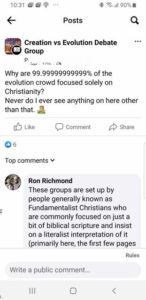My dialogue on Creationism 2023 08 05
Intro…
In the midst of a Facebook dialogue, one of the responders chose to question the common incidence of Christians do actively consumed with the critique of Evolution.
In my response, I attempt to explain:
- reasons why many participatns in Creation vs Evolution chat groups exist on Facebook
- the common differences in perspective/mindset between Creationists and those here who debate them
- my understanding of why debates are often so harsh and and largely ineffective.
Also note: The term “Creationist” as used in most of these chat groups are more precisely known as Young Earth Creationists (YEC), a term favoured by the Creations Science Association. Literalist interpretation for this group is based on a belief that the Earth was created much is now appears about 6000 years ago, modified to a degree by the effects of the Noahic Flood. It tends to reject objective science findings that clearly indicate a much older earth.
The Posting…
Why are 99.99999999999% of the evolution crowd focused solely on Christianity?
Never do I ever see anything on here other than that. 🤷🏼♂️
My Response…
These groups are set up by a subset of people generally known as Fundamentalist Christians who are commonly focused on just a bit of biblical scripture (primarily opening chapters of the book of Genesis) and insist on a literalist interpretation of the creation account recorded there. By literalist, we mean, an approach to interpreting words, stories, and “expressed truths” in terms of a particular fixed mindset that assumes there is only one obvious meaning for any word that can be read. People who practice a literalist approach to understanding the Judeo-Christian scriptures often lack the ability to seriously consider other possible interpretations. Being able to consider multiple points of view, or weigh alternate interpretations, is a function generally of broad life experience and deeper reflections.
There is a clash of methodology common in these “debates” between a way of thinking that accepts an a priori conclusions… into which all the interpretations and data or “facts” are forced to fit… and the methods of science (when diligently practiced) that start with data, then tentatively searches for theories or generalizations that best support by the data. In both cases there is a search for meaning based on inter-connections that make sense to us, but the methods of approaching this are generally quite different.
Of course, lots of people who would be quick to criticize those who are religious can themselves be literalist in a similar way. Literal interpretations by non-believers tend to portray “religious truth” as nonsense… so it is common here to see literalists of both kinds doing battle as attitudes harden, ideas are ridiculed, people’s intelligence is questioned, and even “hate” is promoted.
On the other hand, philosophy, and lesser forms of respectful dialogue, focuses on reasoned analysis, demonstrating, at least to a degree, a willingness to listen and rationally agree or refute.
[My original responses, as with other postings reproduced here, have been edited for better clarity and form.]
You are invited to post public comments below or send me such privately to Ronald.Richmond@sasktel.net
First posted here: 2023/08/05
Latest revision: 2025/04/17
